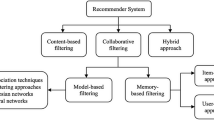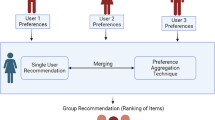Abstract
In the area of recommender systems, collaborative filtering is widely used technique for recommending appropriate items to a user based on the available ratings given by similar users. Most recommender systems (RSs) work only on the single criterion rating i.e., overall rating, however overall rating may not be a good representative of a user preference. Single criterion collaborative filtering (CF) does not generate more reliable recommendations because it suffers from correlation based similarity problems. Moreover, representation of uncertain user preferences is another concern of CF. In our work, we develop a novel fuzzy Bayesian approach to multi-criteria CF for handling uncertain user preferences and correlation based similarity problems. Further, incorporation of multi-criteria ratings into CF would be helpful for generating effective recommendations. Through experiments on Yahoo! Movies dataset, we compare our proposed approach to baseline approaches and demonstrate its effectiveness in terms of accuracy, recall and f-measure.






Similar content being viewed by others
References
Adomavicius G, Kwon Y (2007) New recommendation techniques for multicriteria rating systems. IEEE Intell Syst 22(3):48–55
Adomavicius G, Kwon Y (2015) Multi-criteria recommender systems. In: Recommender systems handbook. Springer, pp 847–880
Adomavicius G, Tuzhilin A (2005) Toward the next generation of recommender systems: a survey of the state-of-the-art and possible extensions. IEEE Trans Knowl Data Eng 17(6):734–749
Al-Shamri MYH, Bharadwaj KK (2008) Fuzzy-genetic approach to recommender systems based on a novel hybrid user model. Expert Syst Appl 35(3):1386–1399
Anand D, Bharadwaj KK (2013) Pruning trust–distrust network via reliability and risk estimates for quality recommendations. Soc Netw Anal Min 3(1):65–84
Balabanović M, Shoham Y (1997) Fab: content-based, collaborative recommendation. Commun ACM 40(3):66–72
Bharadwaj KK, Al-Shamri MYH (2009) Fuzzy computational models for trust and reputation systems. Electron Commer Res Appl 8(1):37–47
Breese JS, Heckerman D, Kadie C (1998) Empirical analysis of predictive algorithms for collaborative filtering. In: Proceedings of the fourteenth conference on uncertainty in artificial intelligence. Morgan Kaufmann Publishers Inc, pp 43–52
de Campos LM, Fernández-Luna JM, Huete JF (2008) A collaborative recommender system based on probabilistic inference from fuzzy observations. Fuzzy Sets Syst 159(12):1554–1576
Dwivedi P, Bharadwaj KK (2013) Effective trust-aware e-learning recommender system based on learning styles and knowledge levels. Educ Technol Soc 16(4):201–216
Dwivedi P, Bharadwaj KK (2015) e-learning recommender system for a group of learners based on the unified learner profile approach. Expert Syst 32(2):264–276
Hofmann T, Puzicha J (1999) Latent class models for collaborative filtering. In: IJCAI, vol 99
Jannach D, Karakaya Z, Gedikli F (2012) Accuracy improvements for multi-criteria recommender systems. In: Proceedings of the 13th ACM conference on electronic commerce, pp 674–689
Kant V, Bharadwaj KK (2013) Fuzzy computational models of trust and distrust for enhanced recommendations. Int J Intell Syst 28(4):332–365
Kant V, Bharadwaj KK (2013) Integrating collaborative and reclusive methods for effective recommendations: a fuzzy bayesian approach. Int J Intell Syst 28(11):1099–1123
Kant V, Dwivedi P (2015) A fuzzy bayesian approach to integrate user and item based collaborating filtering for enhanced recommendations. In: Proceedings of the 17th international conference on information integration and web-based applications & services, p 75. ACM
Katarya R, Verma OP (2016) A collaborative recommender system enhanced with particle swarm optimization technique. Multimed Tools Appl 1–15
Kim K-R, Moon N (2012) Recommender system design using movie genre similarity and preferred genres in smartphone. Multimed Tools Appl 61(1):87–104
Lakiotaki K, Tsafarakis S, Matsatsinis N (2008) Uta-rec: a recommender system based on multiple criteria analysis. In: Proceedings of the 2008 ACM conference on recommender systems. ACM, pp 219–226
Manouselis N, Costopoulou C (2007) Analysis and classification of multi-criteria recommender systems. World Wide Web 10(4):415–441
Miyahara K, Pazzani MJ (2000) Collaborative filtering with the simple bayesian classifier. In: Proceedings of the 6th pacific rim international conference on artificial intelligence. PRICAI’00. Springer, Berlin, pp 679–689
Nilashi M, Ibrahim OB, Ithnin N, Zakaria R (2015) A multi-criteria recommendation system using dimensionality reduction and neuro-fuzzy techniques. Soft Comput 19(11):3173–3207
Nilashi M, Jannach D, Ibrahim O, Ithnin N (2015) Clustering-and regression-based multi-criteria collaborative filtering with incremental updates. Inf Sci 293:235–250
Parveen R, Jaiswal AK, Kant V (2012) E-learning recommendation systems–a survey. Int J Eng Res Dev 4:10–12
Robles V, Larrañaga P, Peña JM, Marbán O, Crespo J, Pérez MS (2003) Collaborative filtering using interval estimation naīve bayes. In: Lecture notes in artificial intelligence (advances in web intelligence
Roy B (2013) Multicriteria methodology for decision aiding, vol 12. Springer, Berlin
Toledo RY, Mota YC, Martínez L (2015) Correcting noisy ratings in collaborative recommender systems. Knowl-Based Syst 76:96–108
Yager RR (2003) Fuzzy logic methods in recommender systems. Fuzzy Sets Syst 136(2):133–149
Zenebe A, Norcio AF (2009) Representation, similarity measures and aggregation methods using fuzzy sets for content-based recommender systems. Fuzzy Sets Syst 160 (1):76–94
Zigoris P, Zhang Y (2006) Bayesian adaptive user profiling with explicit & implicit feedback. In: Proceedings of the 15th ACM international conference on information and knowledge management. ACM, pp 397–404
Author information
Authors and Affiliations
Corresponding author
Rights and permissions
About this article
Cite this article
Kant, V., Jhalani, T. & Dwivedi, P. Enhanced multi-criteria recommender system based on fuzzy Bayesian approach. Multimed Tools Appl 77, 12935–12953 (2018). https://doi.org/10.1007/s11042-017-4924-2
Received:
Revised:
Accepted:
Published:
Issue Date:
DOI: https://doi.org/10.1007/s11042-017-4924-2




